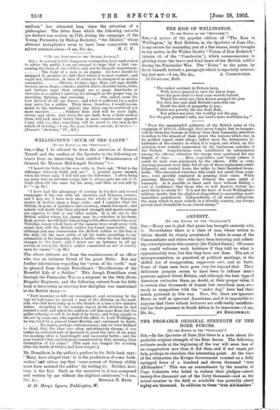THE RISE OF WELLINGTON.
[To THE EDITOR OF THE "81.n-ram:I SIR,—A notice of the popular edition of " The Rise Wellington," by Earl Roberts, in the Spectator of June 21st, is my excuse for reminding you of a fine stanza, lately brought to my notice, in Sir Walter Scott's "Vision of Don Roderick" (stanza vii. of the " Conclusion"), which commemorates in glowing verse the brave and kind heart of the British soldier during the Peninsular War. The " Notes " to the poem, by Scott himself, include a paragraph which is especially interest-
" The rudest sentinel, in Britain born, With horror paused to view the havoc done, Gave his poor crust to feed some wretch forlorn, Wiped his stern eye, then fiercer grasped his gun.
Nor with less zeal shall Britain's peaceful son Exult the debt of sympathy to pay;
Riches nor. poverty the tax shall shun, Nor prince nor peer, the wealthy nor the gay,
Nor the poor peasant's mite, nor bard's more worthless lay."
" Even the unexampled gallantry of the British army in the campaign of 1810-11, although they never fought but to conquer, will do them less honour in history than their humanity, attentive to soften to the utmost of their power the horrors which war, in its mildest aspect, must always -inflict upon the defenceless in- habitants of the country in which it is waged, and which, on this occasion, were tenfold augmented by the barbarous cruelties of the French. Soup-kitchens were established by subscription among the officers, wherever the troops were quartered for any
length of time Rice, vegetables, and 'bread (where it could be had) were purchased by the officers. Fifty or sixty starving peasants were daily fed at one of these regimental estab- lishments, and carried home the relics to their famished house- holds. The emaciated wretches, who could not crawl from weak- ness, were speedily employed in pruning their vines. While pursuing Massena, the soldiers evinced the same spirit of humanity. Is it possible to know such facts without feeling a sort of confidence, that those who so well deserve victory are most likely to attain it? It is not the least of Lord Wellington's military merits, that the slightest disposition to marauding meets immediate punishment. Independently of all moral obligation, the army which is most orderly in a friendly country, has always proved most formidable to an armed enemy."


















































 Previous page
Previous page